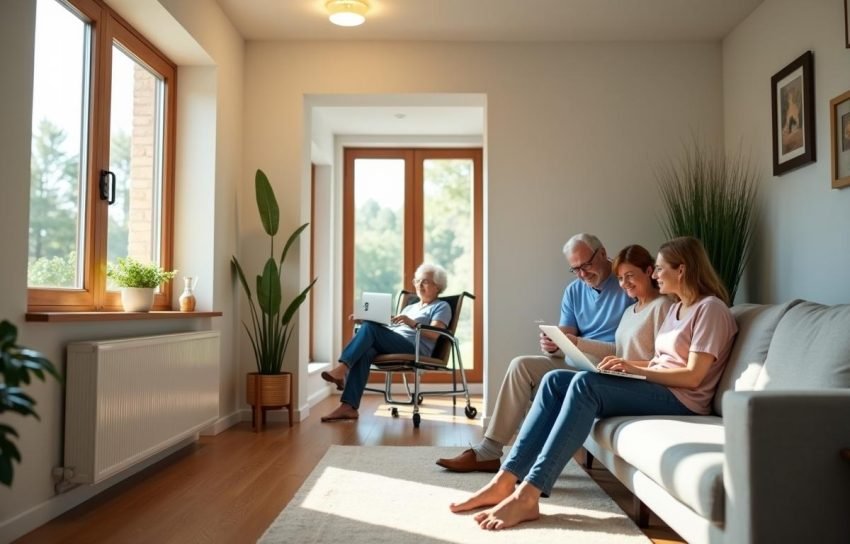Future-Proof Your Life With These Senior Care Essentials

Balancing work and family, families can benefit from understanding senior care essentials. It’s no surprise that planning ahead for aging in place and long-term care can ease worry in the future. By taking small steps now, you can create a supportive environment, ensure safety, and maintain quality of life for your loved ones or even for yourself.
Contents
- 1 Creating an Adaptable Home for Elderly Care
- 2 Prioritizing Senior Health with Nutrition and Physical Activity
- 3 Exploring Dementia Care and Cognitive Support
- 4 Navigating Caregiver Support and Home Care Services
- 5 Embracing Mobility Aids and Transportation Services
- 6 Fostering Social Engagement in Assisted Living
- 7 Planning Ahead with Long-Term Care and Palliative Care
- 8 Moving Forward with Confidence
Creating an Adaptable Home for Elderly Care
In many households, making home modifications can be a vital step toward an age-friendly living space. By installing grab bars in bathrooms, removing tripping hazards, and upgrading lighting, you enhance daily comfort and reduce potential accidents. These changes support aging adult support initiatives and allow seniors to maintain autonomy while staying in a familiar setting.
Consider wide doorways and non-slip flooring to accommodate walkers or wheelchairs. Small upgrades, such as replacing doorknobs with lever handles, can make a big difference in everyday tasks. If you’re unsure where to start, consult home care products for seniors to explore different solutions.
Balancing Respite Care and Independent Living
For many older adults, the right combination of professional help and personal independence can be transformative. Respite care services allow family caregivers to take breaks and recharge, which helps preserve strong relationships. Meanwhile, seniors can stay in their homes longer, a key goal when focusing on elderly care and maintaining dignity.
Prioritizing Senior Health with Nutrition and Physical Activity
Staying active and fueling the body with nutrient-rich meals can significantly improve senior health. Proper hydration and balanced diets lower risks of chronic illnesses, while gentle exercise supports joint function and cardiovascular well-being. Combining these efforts with regular health monitoring ensures that any issues are addressed promptly.
Professional geriatric services often include dietitians and physical therapists to guide seniors in making healthier choices. If your loved one struggles with meal prep, consider signing up for a service that delivers fresh, senior-friendly foods to the doorstep. These small steps encourage long-term wellness and help with aging population needs.
Senior Nutrition Tips for Better Well-Being
Emphasize fiber-rich foods, lean proteins, and plenty of fruits and vegetables. For tailored advice, explore nutrition for older adults to find recipes and meal ideas that cater to specific dietary restrictions. These mindful approaches boost energy levels and support overall vitality.
Exploring Dementia Care and Cognitive Support
When memory concerns arise, dementia care becomes essential for ensuring consistent support. Early planning fosters a comfortable routine and can slow the progression of symptoms. Care planning should include regular checkups, mental exercises, and a calm environment free from overwhelming stimuli.
Resources like cognitive support for elderly can help family members and caregivers develop strategies to manage daily tasks. From labeling household items to incorporating memory-friendly activities, each approach can reduce confusion and keep seniors engaged in meaningful ways.
Creating a Calm Environment
For individuals experiencing cognitive changes, overstimulation can lead to distress. Soft lighting, minimal noise, and clearly labeled spaces contribute to a sense of stability. These considerations help maintain emotional balance and promote better overall senior wellness.
Families often find themselves juggling multiple responsibilities, making caregiver support a lifeline. Hiring home care services can reduce stress and help seniors receive personalized assistance with daily living tasks. This can include help with bathing, meal preparation, or medication reminders.
To build the right team, ask for references and check qualifications, especially when dealing with specialized needs like dementia care or palliative care. Working with trusted providers strengthens your loved one’s security and fosters peaceful aging in place.
Communicating Your Needs
Open conversations about healthcare preferences and personal comfort can prevent misunderstandings. It’s vital to discuss boundaries, schedules, and goals with both the senior and the care professionals. This approach ensures consistent caregiver coordination and helps seniors feel more in control.
Embracing Mobility Aids and Transportation Services
Limited mobility barriers can lead to isolation, so incorporating mobility aids is crucial for many seniors. Whether it’s a simple cane, walker, or power chair, the right tool can maintain freedom of movement. These devices become even more valuable when paired with accessible transportation services that help older adults attend appointments and social events.
Look into options like ride-sharing programs, volunteer drivers, or specialized shuttles designed for independent living resources. Remaining active in the community not only promotes physical well-being but also lifts mood and preserves a sense of purpose.
Adapting the Home for Safe Movement
If a senior is using a walker or wheelchair, ensure hallways remain obstacle-free. Make sure electrical cords are tucked away and rugs are secured to the floor. A supportive, clutter-free environment complements the benefits of mobility aids for seniors.
Fostering Social Engagement in Assisted Living
Transitioning to various types of assisted living can be positive if the community encourages social engagement. Shared dining areas, group outings, and on-site activities help seniors form friendships and maintain an active routine. Familiar places also alleviate loneliness and can improve mental health.
Explore assisted living accessories that enhance comfort and independence, such as devices linking medical alert systems to staff for immediate assistance. An environment that provides opportunities for community interaction and recreational pursuits is key to thriving during the golden years.
Encouraging Hobbies and Interests
When seniors pursue hobbies, they experience greater mental stimulation and self-esteem. Activities like gardening, reading clubs, or light exercise classes create a sense of purpose. Even small gatherings, like coffee meetups, can make a big difference in overall happiness.
Planning Ahead with Long-Term Care and Palliative Care
As the years progress, it’s wise to consider long-term care options that fit your family’s expectations. This might involve researching specialized facilities for complex medical conditions or planning for palliative care if needed. Early discussions about end-of-life wishes ensure dignity and reduce feelings of uncertainty.
Some families choose to invest in insurance plans that cover advanced healthcare, while others rely on local resources for direct services. Tools like caregiving tools for seniors can assist in managing medication schedules, daily routines, or important contact information. Being proactive eases transitions and offers greater peace of mind.
Integrating Medical Alert Systems
Medical alert systems can provide a crucial lifeline, especially for older adults who live alone. Pressing a button during an emergency can summon help swiftly, delivering reassurance to both the senior and concerned family members. This technology works well alongside caregiver visits, forming a solid safety net.
Moving Forward with Confidence
Building a supportive network and focusing on senior safety keeps everyone at ease. By knowing what steps to take and when, you ensure a smoother transition into the later stages of life. Whether it’s elder care necessities for daily tasks or retirement living essentials for leisure, thoughtful planning pays off.
Staying informed about the changing needs of aging loved ones allows you to adapt with each season of life. A proactive approach whether through regular checkups, exploring specialized geriatric services, or researching senior-friendly gadgets ensures that everyone involved can move forward with confidence and dignity.



